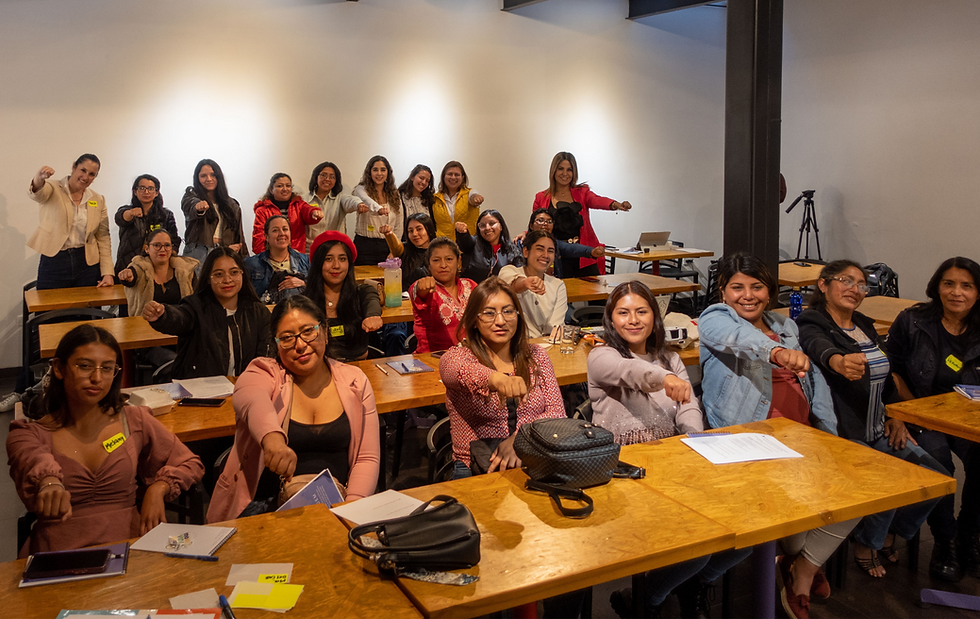Electric Mobility in Latin America: Insights from the E-Moviliza Workshop Series
- Thamires Pecis

- Aug 6, 2025
- 3 min read
The E-Moviliza project hosted the workshop series “Transition to Electric Mobility: Knowledge Exchange for Regulatory Development and Capacity Building”, bringing together experts from Ecuador, Chile, and Colombia to exchange insights and strengthen electric mobility regulation across Latin America.
Held in Quito, the event provided a space for technical discussions, policy dialogue, and regional collaboration to accelerate the shift toward inclusive and sustainable electric transport.

Day 1: Fuel Quality, Vehicle Efficiency, and Electric Vehicle Safety
Sebastián Galarza, Executive Director of CMS Chile, opened the first day with a session focused on regional and international best practices in fuel quality, highlighting key lessons learned and regulatory approaches that have been effective across Latin America and beyond.
Daniel Cordero, Professor at the University of Azuay (Ecuador), followed with national insights on the impacts of air quality, reinforcing the need for regulatory frameworks tailored to Ecuador’s environmental context.
Claudio Mena, Electromobility and Vehicle Standards Lead at CMS, addressed energy efficiency regulations, emphasizing the importance of harmonized standards in supporting the transition to electric mobility. He was followed by Jorge Martínez, Professor at EPN, who presented on national EV safety regulations, contextualized within global trends and innovations in the sector.
To close the technical sessions, Fabricio Hoyos, Standardization Specialist, gave a detailed overview of Ecuador’s electric vehicle safety standards and highlighted areas for improvement.
The day ended with an interactive group activity, where participants from the public sector, academia, private companies, and civil society co-developed a roadmap for cleaner, more efficient, and sustainable transport in Ecuador, setting the tone for continued collaboration.
Day 2: Regulatory Frameworks and Best Practices for EVs and Charging Infrastructure
The second day of the workshop focused on regulatory frameworks and best practices for electric vehicles and charging infrastructure, bringing together national and regional experts to discuss the electrification of transport systems.
Iván Sánchez, Specialist in Electrical and Energy Studies, provided an overview of Ecuador’s charging infrastructure, addressing recent advances, existing gaps, and key challenges for scaling up nationwide.
Diland Castro, Charging Infrastructure and Energy Lead at CMS, shared regional best practices related to interoperability and user experience in public charging systems, emphasizing the value of standardization for seamless operation across networks.
The day continued with a technical panel on requirements, standards, and tariff structures for EV infrastructure. Moderated by Freddy Ordóñez, Professor at EPN, the panel included:
Paola Quintana, President of the National Electromobility and Scrappage Working Group
Daniel Marcillo, Director of Regulation at INEN (National Institute for Standardization)
Diland Castro, CMS
Fernando Amador, Undersecretary of Land Transport, Ministry of Transport and Public Works (MTOP)
Iván Sánchez, Electrical and Energy Specialist
The panel enabled a rich exchange of technical and institutional perspectives, reinforcing the need for clear and unified standards, transparent tariff systems, and collaborative governance to guide Ecuador toward a resilient and inclusive transition to electromobility.
Day 3: Circular economy and end-of-life vehicle management
The final day of the workshop series focused on the end-of-life phase of electric and conventional vehicles, with emphasis on battery recycling, circular economy models, and international experiences.
The day opened with a participatory session on regulatory options for decommissioning vehicles. Fabián Espinoza (IDB) introduced initiatives inspired by the RENOVA Plan, which promotes the replacement of old, high-emission vehicles through incentives and public-private cooperation. Stefano Sacco (CMS) followed with a review of international approaches to end-of-life vehicle and battery regulation.
Next, Enrique Espina (USACH) shared Chile’s experience with second-life applications for EV batteries. Verónica Morales (EPN) discussed circular business models for emerging markets, and Víctor Rojas (Clean Technologies Institute) presented on battery recycling technologies and opportunities for regional collaboration.
To close, Johanna Rosales (Vertmonde) led a hands-on session on circular economy models, presenting Ecuador’s regulatory context and private sector initiatives for battery reuse and recycling.
The E-Moviliza project
The E-Moviliza project is a national initiative in Ecuador that promotes low-carbon electric mobility to reduce emissions, fossil fuel use, and air pollution. It combines policy support, pilot projects, and gender-inclusive approaches to enable long-term, sustainable transport solutions.
The project is led by the Ministerio del Ambiente, Agua y Transición Ecológica, funded by the Global Environment Facility (GEF), implemented by the UN Environment Programme, and executed by UEMI, Centro de Movilidad Sostenible (CMS), and Escuela Politécnica Nacional (EPN).












Meet American People Online
Free USA Dating Site
American Singles
American Personal Ads
Meet American Men and Women For Dating
Free Dating in USA
Dating Site
Mating And Dating in USA